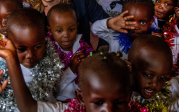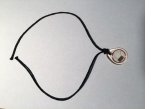Feedback/Comments from Our Readers
|
 Comments, questions and feedback is always welcome. Comments, questions and feedback is always welcome.
With summer approaching we have decided to send out a monthly version of the Global Health Weekly. It will return as a weekly newsletter mid August 2018.
|
|
Thanks to everyone for taking their time to come and join Global Health Rounds with us this year. With everyone's busy day to day schedule we are going to wrap up this year's Academic year. We look forward to the next upcoming academic year.
We're always looking for new speakers and ideas for topics for Global Health Rounds for the new coming up academic year in the Fall 2018. If you have speakers or topics, please contact Cheryl Knowles at GHFoMD@ualberta.ca. |
|
Improving women's and children's health has lifelong impact
|
 A new way of directing money towards interventions which improve the health of women and girls is already reaping benefits, according to a new report.
Improving the health and education prospects of women, children and adolescents is seen as one of the best ways to lift the whole of society out of the poverty trap, according to experts.
Ensuring women seek antenatal care, are assisted by trained healthcare workers during childbirth, have access to reproductive healthcare and can feed their children has lifelong impact.
To read more about this article go to https://www.telegraph.co.uk/news
|
|
Which countries have the highest rates of modern slavery and most victims?
|
At least 40 million people worldwide are estimated to be trapped in modern slavery today - more than ever before - as poverty, conflict and crises fuel the growing global slave trade.
From men made to work in factories, farms and fishing boats and women forced to sell sex to people exploited for their organs and children sent to beg or forced to marry, human trafficking is one of the fastest growing criminal enterprises.
North Korea, Eritrea and Burundi are estimated to have the world's highest rates of modern-day slavery, with India, China and Pakistan home to the largest number of victims.
The United Nations has designated July 30 World Day against Trafficking in Persons, with the world striving to meet a U.N. goal to end forced labour and modern slavery by 2030.
Here are some key facts and figures about modern slavery and human trafficking worldwide:
* People can be trafficked for various forms of exploitation such as prostitution, forced labour, begging, criminality, domestic servitude, forced marriage and organ removal.
To read more about this article go to http://news.trust.org
|
|
This $1 Necklace Is Helping Thousands of Indian Kids Lead Healthier Lives
|
 Every year, roughly 500,000 children in India under the age of 5 die from vaccine-preventable diseases. This staggering figure is difficult to comprehend. But when one considers that just 40% of mothers in the district of Udaipur in Rajasthan, India receive the recommended four antenatal care checkups, a picture of a society with an ineffective health-care system begins to emerge. Every year, roughly 500,000 children in India under the age of 5 die from vaccine-preventable diseases. This staggering figure is difficult to comprehend. But when one considers that just 40% of mothers in the district of Udaipur in Rajasthan, India receive the recommended four antenatal care checkups, a picture of a society with an ineffective health-care system begins to emerge.
Community health workers play a key role in making sure children are receiving necessary vaccines at the right time. However, without reliable health records, health workers sometimes must rely on a mom’s memory to provide care, making decisions less accurate or beneficial to the child.
But Khushi Baby, winner of the Johnson & Johnson GenH Challenge, hopes to change that. The GenH Challenge rewards innovative solutions that address the pressing needs of those who are on the front lines of delivering care.
To read more about this article go to https://www.globalcitizen.org
|
|
Turkey Stops Registering Syrian Asylum Seekers
|
 Turkish authorities in Istanbul and nine provinces on or near the Syrianborder have stopped registering all but a handful of recently arrived Syrian asylum seekers. The suspension is leading to unlawful deportations, coerced returns to Syria, and the denial of health care and education.
The European Commission has recently praised Turkey’s asylum system and plans to release the second batch of €3 billion under its March 2016 migration deal which includes support for refugees in Turkey. European Union institutions and governments have stayed publicly silent on the suspension and other refugee abuses committed by Turkey, suggesting their primary concern is to halt the movement of asylum seekers and migrants from Turkey to the EU.
“While the EU supports Turkey to deter asylum seekers from reaching Europe, it’s turning a blind eye to Turkey’s latest steps to block and discourage people fleeing Syria,” said Gerry Simpson, associate refugee program director at Human Rights Watch. “But forcing Syrians who manage to get past Turkey’s border guards to live in legal limbo only risks driving them underground and onward to the EU.”
To read more about this article go to https://www.hrw.org/news
|
|
Access to Medical Devices in Low-Income Countries: Addressing Sustainability Challenges in Medical Device Donations
|
 In eastern Uganda, a regional hospital receives a much-needed donation: an x-ray machine that appears to be in good working condition upon arrival. The hospital staff quickly puts the machine to use, only to have it fail during a procedure. With no trained biomedical technicians at the hospital, the machine sits unused for months. Eventually, an available technician is located in Kampala. He travels to the hospital and examines the machine, identifying the replacement part that is likely needed, but he cannot verify the part without the machine’s accompanying manual. The hospital finds the new part to be more costly than anticipated and must be special ordered because it is not available in the country. When balancing the costs against the other demands on its limited budget, the hospital administration regretfully decides it cannot afford to spend time and money on securing the new part. Despite the need for its services, the x-ray machine remains out of use.
Medical devices [the terms “medical device” and “medical equipment,” are used interchangeably here (see [1] for full definitions)] like the x-ray machine have been deemed essential to health care systems in the prevention, diagnosis, and treatment of illness and disease for all populations. The advances and innovation of medical devices over time have improved accuracy, efficiency, and efficacy within health care systems, allowing people to live longer, healthier lives.
|
|
|
|
Save the Dates of Local Events!
|
Global Health Rounds
to return in the Fall 2018
|
|
Conferences, Symposiums & Lectures
|
Save this link to your favorites as I update it daily will all events, symposiums, etc., just click here.
CUGH 2019 Global Health Conference Translation
and Implementation
for Impact in Global Health
Date: March 8 - 10, 2019
Where: Hilton Chicago Hotel
|
|
Call for Abstracts/Submissions
|
|
Details to follow in the Fall Term 2018
|
|
Newsletter & Special Journal Editions
|
|
|